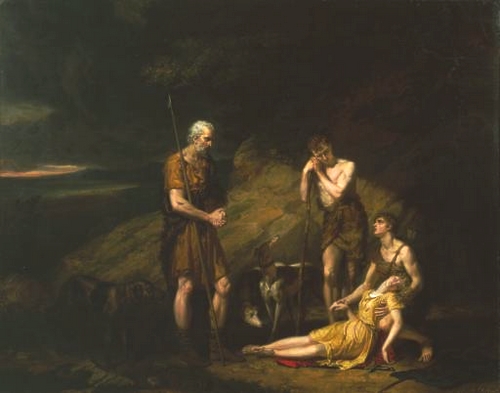
Today we're paying homage to Shakespeare with a beautiful song written by Gerald Finzi, a composer who appears on Liederabend for the first time; another day I'll talk about him and his work but today, I'll focus on the poet! The verses of Fear no more the heat o' the sun belong to Cymbeline, a play written by Shakespeare around 1609; at the same time as The Tempest, to name a best-known play. Fear no more the heat o' the sun is a dirge sung by two young men at scene II of the Act IV; I haven't read Cymbeline (not yet) but I think I'll manage to explain the context of the song.
Those two young men and their father took in an exhausted boy they found in a cave. Shortly after, the boy is found dead; So they take him to the forest, cover him with flowers and sing their song. You might think it would have been more convenient to bury the boy instead of covering him with flowers, but thank God they don't do it because he's not dead, it only seems so because he took a potion that his stepmother gave him with the worst of intentions. I'm talking about "him" but the boy is actually a girl, Imogen, the daughter of King Cymbeline, who dresses as a boy to save her life. However, she's not hiding from her stepmother (she's not aware of her threat) but from Posthumus, her husband. That lovely man accepted the bet of another knight (so to speak) who would prove Imogen's infidelity. The pieces of evidence are false but Posthumus orders Imogen to be killed; the executioner takes pity on the girl and lets her go, disguised as a boy. And that's when the two boys (who ignore they are Imogen's brothers) found her in the cave. Some pages later all plot misunderstandings, which reminds us of Così fan tutte, Snow White and Othello, are solved and, surprisingly enough, Imogen and Posthumus all lived happily ever after.
Let's make a leap of few centuries until 1929, when Gerald Finzi wrote his song. Between 1938 and 1942 he wrote four more songs, all of them with texts by Shakespeare, including two that we know in other versions: Come away, death and Who is Silvia. This cycle, Let us garland bring (the name is the last verse from Who is Silvia) was released on 12th October 1942 in a concert tribute to Ralph Vaughan Williams, who turned 70 years old that day; The following week the orchestral version was released.
I said before that Fear no more the heat o' the sun is a beautiful song; I know I use this adjective a great deal but, if I can choose, why should I choose a song I didn't like? Finzi gives the first three stanzas of the poem a similar musical treatment, elegiac and calmed. After the third one, the interlude is longer and becomes more dramatic, and it sounds as if the song was ending. But the fourth stanza finally arrives; it begins declaimed and goes over the main melody at the two last verses.
There are only a few recordings of this song with piano accompaniment; Still, it was difficult to pick one to share with you because I like most of them. I finally chose that of Bryn Terfel and Malcolm Martineau, I hope you like it too.
Fear no more the heat o' the sun;
Nor the furious winter's rages,
Thou thy worldly task hast done,
Home art gone, and ta'en thy wages;
Golden lads and girls all must,
As chimney sweepers come to dust.
Fear no more the frown of the great,
Thou art past the tyrant's stroke:
Care no more to clothe and eat;
To thee the reed is as the oak:
The sceptre, learning, physic, must
All follow this, and come to dust.
Fear no more the lightning-flash,
Nor the all-dread thunder-stone;
Fear not slander, censure rash;
Thou hast finished joy and moan;
All lovers young, all lovers must
Consign to thee, and come to dust.
No exorciser harm thee!
Nor no witchcraft charm thee!
Ghost unlaid forbear thee!
Nothing ill come near thee!
Quiet consummation have;
And renowned be thy grave!














Comments powered by CComment